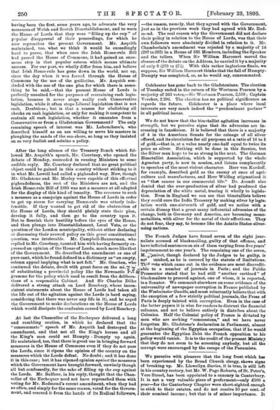At last the Chancellor of the Exchequer delivered a long
and rambling oration, in which he declared that the " consummate " speech of Mr. Asquith had destroyed the amendment, and that not all the King's horses and all the King's men could set Humpty - Dumpty up again. He maintained, too, that there is great use in bringing forward measures in the House of Commons even if they do not pass the Lords, since it ripens the opinion of the country on the measures which the Lords defeat. No doubt; and it has done it in this case ; but it has ripened opinion against the measures which the Government have brought forward, unwisely though all but confessedly, for the sake of filling up the cup against the Lords. Mr. Balfour, in his reply, thought that the Chan- eellor of the Exchequer need not have reproached them with voting for Mr. Redmond's recent amendment, when they had so often, and simply for the same reason, voted for the Govern- ment, and rescued it from the hands of its Radical followers,
—the reason, namely, that they agreed with the Government, just as in the previous week they had agreed with Mr. Red- mond. The real reason why the Government did not declare their policy in relation to the House of Lords, was that their own followers were absolutely divided in relation to it. Mr. Chamberlain's amendment was rejected by a majority of 14 (297 to 283) in a House of 585 Members, including the Speaker and the tellers. When Sir William Harcourt moved the closure of the debate on the Address, he carried it by a majority of only 8 (279 to 271). With this rather inglorious finale, we suppose, Sir William Harcourt thinks that the fall of Humpty- Dumpty was completed, or, as he would say, consummated.


































 Previous page
Previous page